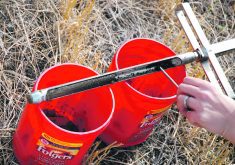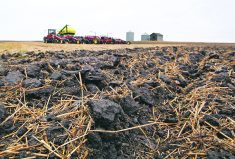Canadian farmers and farm organizations must prepare for the emerging carbon economy and get ahead of policy makers if they hope to have a meaningful influence on regulations pertaining to measuring and monetizing carbon offsets.
“This carbon discussion is coming at us faster than we think,” said Ken Seitz, president and chief executive officer of Nutrien, the world’s largest supplier of farm fertilizers.
“I think the huge risk is that the regulatory environment is going to come crashing down upon us and … that’s the last thing we want as an industry. I think we want farmers to lead the way because we’ll get the best outcome when farmers lead the way.”
Read Also

StatCan stands by its model-based crop forecast
Statistics Canada’s model-based production estimates are under scrutiny, but agency says it is confident in the results.
During a recent presentation in Saskatoon, Seitz cited estimates suggesting that agriculture is responsible for 30 percent of the world’s greenhouse gas emissions.
Agriculture plays an obviously indispensable role in feeding the world and, in years ahead, it will also play an increasingly important role in filling the world’s rapidly expanding demand for biofuels.
But the industry needs to “decarbonize” and be prepared if it hopes to usher in a supportive regulatory environment and maximize opportunities in the carbon economy.
One of the first challenges for the industry is the development of credible science-based arguments that can support favourable policy decisions, Seitz said.
At the farm level, growers should use tools, such as soil sampling, to establish reliable carbon baselines.
Data collected at the farm level contributes to sound crop management decisions, and can be aggregated and used as a tool to influence policy decisions.
The development of reliable regulated carbon markets would provide an economic incentive to get the ball rolling, he added.
Governments should provide economic incentives for farmers by supporting the development of reliable global carbon markets, he said.
According to Carbon RX, a Regina company that originates, digitizes and streams carbon credits in the agriculture, forestry and energy sectors, more than 1,500 multi-national companies around the world have committed to reducing their carbon footprint to net zero.
Those commitments will create a “huge demand” for carbon assets, and have placed Canada, because of its large land base, in a unique position to be a global leader in the development and sale of carbon offsets.
In a recent presentation to farmers, Marty Seymour, chief executive officer of Carbon RX, said there will be opportunities for farmers and land managers to develop reliable revenue streams through carbon management.
But most growers aren’t sampling their soils or collecting basic data on things like soil organic matter and carbon reserves.
“I was trying to find some reliable stats on this but the last I heard, 15 percent of farmers are soil testing,” Seymour said.
“It’s got to be higher than that but it’s still a very small number.”
While some growers reject the climate change narrative and resist steps aimed at decarbonizing their operations, others are eager to embrace it and position themselves for opportunities, Seymour said.


















